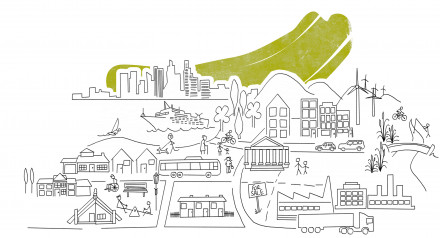Inquiry Into Better Urban Planning – Revenue Funding Options

17 November 2016
Urban development creates a paradox: it generates economic benefits but places significant infrastructure spending burdens on local councils. While councils should ideally fund this investment through the development's economic gains, the reality is often "growth does not pay." Development benefits tend to flow to developers and existing landowners, while councils and current residents bear the extra costs. This discourages councils from investing, hindering development and reducing overall national welfare.
To address this, the paper proposes a framework for aligning infrastructure investment costs with benefits:
- Apply user charges where costs and benefits are readily identifiable and attributable to users.
- Use development contributions and the like to the extent users cannot readily be identified but developments benefiting from the infrastructure can be identified.
- Use targeted/differential rating on land values where the benefits of the investment are likely to be reflected in an increase in unimproved land value over a specific geographic area.
- Use betterment taxes on the increase in land value if that can reasonably capture the value created by the investment.
- Consider other tax bases that may be proxies for aligning costs and benefits.
- Use general rates/government grants as now to the extent that infrastructure investment
cannot be funded from the above.
Publications
Filter publications by topic.
23 February 2024
20 February 2024
20 February 2024
20 February 2024
20 February 2024
13 February 2024
31 January 2024
14 November 2023
31 October 2023
17 October 2023
31 July 2023
3 July 2023
30 June 2023
30 June 2023
20 June 2023
1 May 2023
30 March 2023
28 February 2023
28 February 2023
27 February 2023
27 February 2023
20 February 2023
23 December 2022
21 December 2022
15 November 2022
29 September 2022
1 September 2022
18 July 2022
30 June 2022
9 June 2022
31 May 2022
28 May 2022
28 May 2022
1 April 2022
15 December 2021
1 December 2021
14 November 2021
8 November 2021
8 November 2021
8 November 2021
8 November 2021
27 September 2021
1 September 2021
19 July 2021
1 July 2021
27 May 2021
21 April 2021
21 April 2021
20 April 2021
20 April 2021
1 April 2021
25 February 2021
14 December 2020
4 December 2020
30 November 2020
4 September 2020
31 August 2020
1 August 2020
30 June 2020
30 June 2020
29 April 2020
28 April 2020
18 March 2020
9 March 2020
19 February 2020
31 January 2020
22 January 2020
20 December 2019
16 December 2019
1 December 2019
1 December 2019
30 November 2019
1 November 2019
1 November 2019
16 October 2019
1 September 2019
16 August 2019
1 July 2019
7 June 2019
1 June 2019
1 June 2019
16 May 2019
15 May 2019
1 March 2019
14 February 2019
1 February 2019
1 February 2019
24 December 2018
14 November 2018
6 November 2018
1 November 2018
1 October 2018
1 September 2018
31 August 2018
1 August 2018
14 June 2018
27 April 2018
20 March 2018
22 February 2018
15 December 2017
1 December 2017
1 December 2017
23 November 2017
23 November 2017
1 November 2017
1 November 2017
1 November 2017
29 September 2017
1 September 2017
1 August 2017
1 July 2017
1 July 2017
1 June 2017
21 March 2017
28 February 2017
20 February 2017
20 January 2017
16 December 2016
28 November 2016
25 November 2016
17 November 2016
27 September 2016
1 July 2016
27 April 2016
1 February 2016
12 January 2016
1 December 2015
1 December 2015
1 December 2015
1 December 2015
21 October 2015
15 September 2015
15 September 2015
15 September 2015
15 September 2015
15 September 2015
15 September 2015
15 September 2015
29 June 2015
29 May 2015
29 May 2015
1 May 2015
1 April 2015
5 February 2015
21 January 2015
1 November 2014
1 October 2014
1 October 2014
16 July 2014
1 July 2014
5 June 2014
5 June 2014
1 March 2014
1 March 2014
1 February 2014
19 December 2013
10 December 2013
20 September 2013
1 August 2013
1 August 2013
16 July 2013
13 May 2013
1 December 2012
30 November 2012
30 November 2012
30 November 2012
30 November 2012
30 November 2012
30 November 2012
30 November 2012
30 November 2012
1 May 2012
24 April 2012
30 March 2012





















































































































































































